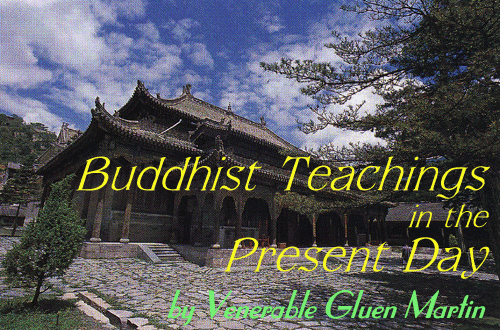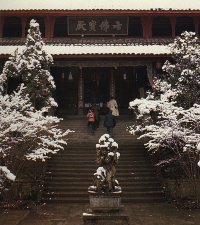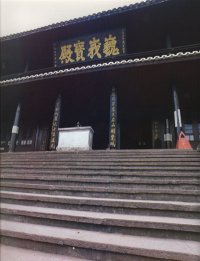|
In Buddhism there are the Buddhist precepts that have been transmitted for our study and practice. The ten Buddhist precepts that help to show the Middle Way, and widely benefit people living in this world.1t is not merely an easy or simple matter to exist in this world. For this reason, some good teachings can benefit us in life. And it is said that the essence of the Buddhist precepts is goodwill for other people and for oneself. One of the ten Buddhist precepts is, 'Do not give way to anger.' Nowadays, in society, some people are concerned with anger. And people are studying and learning how to deal with anger that arises. In the Buddhist composition called 'The Song of Enlightenment' written by Master Hsuan-Chueh, are the words, 'Greed, anger, and ignorance, like bubbles of water, arise and disappear.' These words are saying that anger arises and disappears like the foam of a wave in the ocean. In daily life, it seems that there are some people who are carried away or turned around unreasonably by anger that arises. Foolishly or unreasonably carried away by circumstances, causing themselves and also other people difficulties. At times we read or hear of the word 'rage', such as car-'rage', airplane-'rage', and other rages. And also we hear of anger-management. In Buddhism, for the benefit of people, there is the precept, 'Do not give way to anger.' This precept can serve as an important reference for us in our life. And it is not that human beings exist without anger. Like the words in the Song of Enlightenment, 'Greed, anger, and ignorance, like bubbles of water, arise and disappear.' If we follow the Buddhist Way, we can live wisely, and not be unreasonably carried away by anger. When anger does arise, we can wisely use our anger. Without foolishly getting angry at other people, and without putting our anger onto other people, we can positively use our anger. We can positively use our anger to do our best each and everyday. It is possible to use the anger, or this emotion in order to do our best, and to diligently progress in a right direction. Like this, our life can improve, and we can make our world.
Shakyamuni Buddha replied, 'One word of anger.' One word of anger hurts other people the most of all. From these words, we can see that we have to be very careful with anger that arises in life. Instead of getting angry at other people, certainly we can use the anger positively to improve our own life. Perhaps these teachings may help in our study and practice concerning anger. Also, in Buddhism, heaven refers to one of the six realms of existence. Heaven is one of the six realms of existence, or six conditions which human beings may pass through in daily life. The six realms of existence refers to:
These six realms of existence refer to the six conditions or six states of mind, which human beings may pass through constantly in our daily life while the heavenly beings in the realm of pleasant things are impermanent. In our daily life we do not always exist in heaven. We have to work and have to study in our daily life. We do not remain in heaven in our daily life.
And recently, it is reported that many people are affected by depression and affected by the condition of being depressed. Earnestly practicing and following the Buddhist Way, certainly it is possible to stay out of depression. Each and everyday being diligent, doing our best, and making right effort, we can stay out of depression. Also, we can take care of ourselves. This body of ours is called the Dharma body. In Buddhism we say the Dharma body. For this reason, it is important to take good care of ourselves. And when some things in life do not turn out exactly as we had expected, we can then pay attention to all of the details of our life. It is not just an easy matter to exist in this world. Human existence
is not just an easy or simple matter. Thankfully, we have the teachings
and practices of the Buddhist Way, which can positively help people
living in this world. Fortunately, there is the Buddhist Way for our
benefits.
|


 During
the time of Shakyamuni Buddha, a person once asked the Buddha, a person
once asked the Buddha, 'What is the sharpest spear?' This person, who
was a General in the military, was asking 'What hurts other people the
most?' or, 'What is the sharpest weapon?
During
the time of Shakyamuni Buddha, a person once asked the Buddha, a person
once asked the Buddha, 'What is the sharpest spear?' This person, who
was a General in the military, was asking 'What hurts other people the
most?' or, 'What is the sharpest weapon? Fortunately,
it is possible to practice the Buddhist Way, and to live firmly in the
present. We can live firmly, and not be blown about like a fallen leaf
in the wind, through the six realms of existence, and work firmly, study
firmly , and rest firmly. Like this, we can live diligently and quietly.
And we can know some well beings in life. Through the practice and study
of the Buddhist Way, we can live and work quietly, diligently, and firmly.
Fortunately,
it is possible to practice the Buddhist Way, and to live firmly in the
present. We can live firmly, and not be blown about like a fallen leaf
in the wind, through the six realms of existence, and work firmly, study
firmly , and rest firmly. Like this, we can live diligently and quietly.
And we can know some well beings in life. Through the practice and study
of the Buddhist Way, we can live and work quietly, diligently, and firmly.